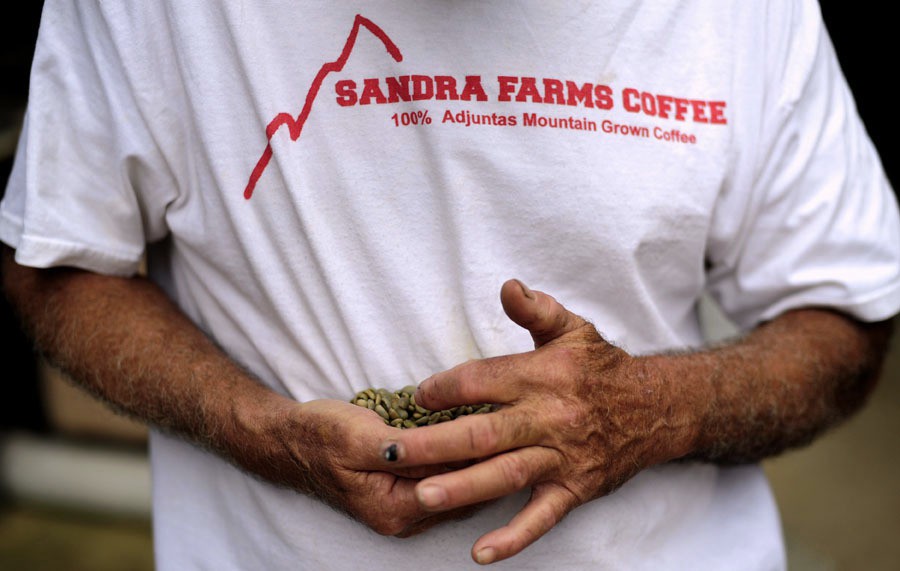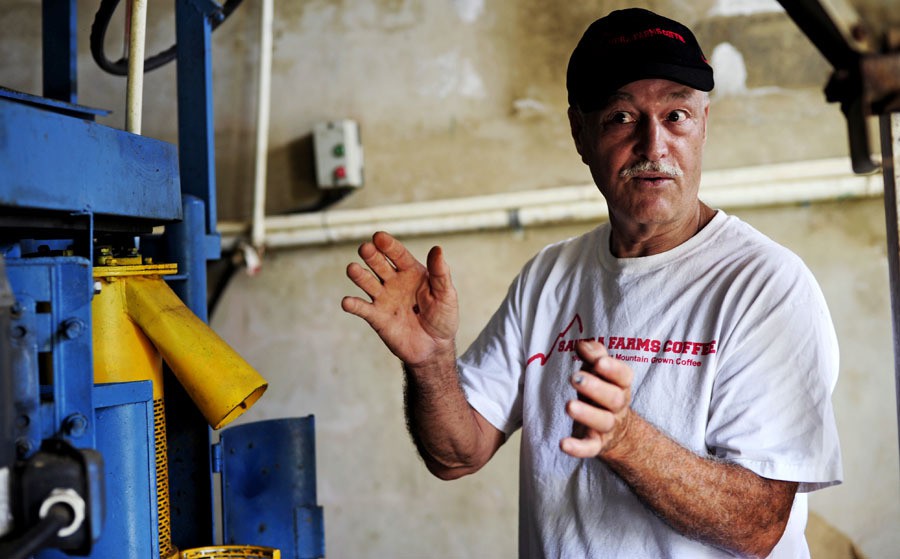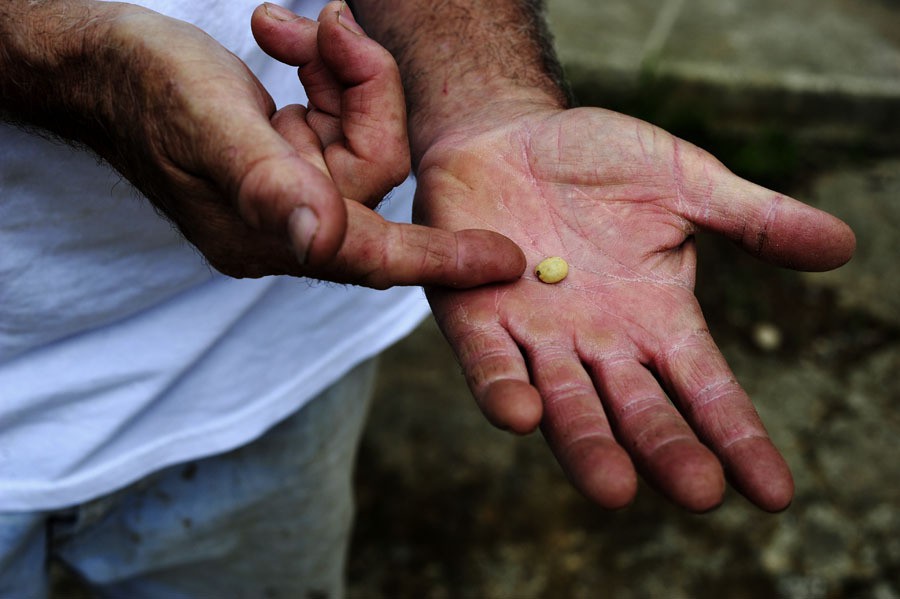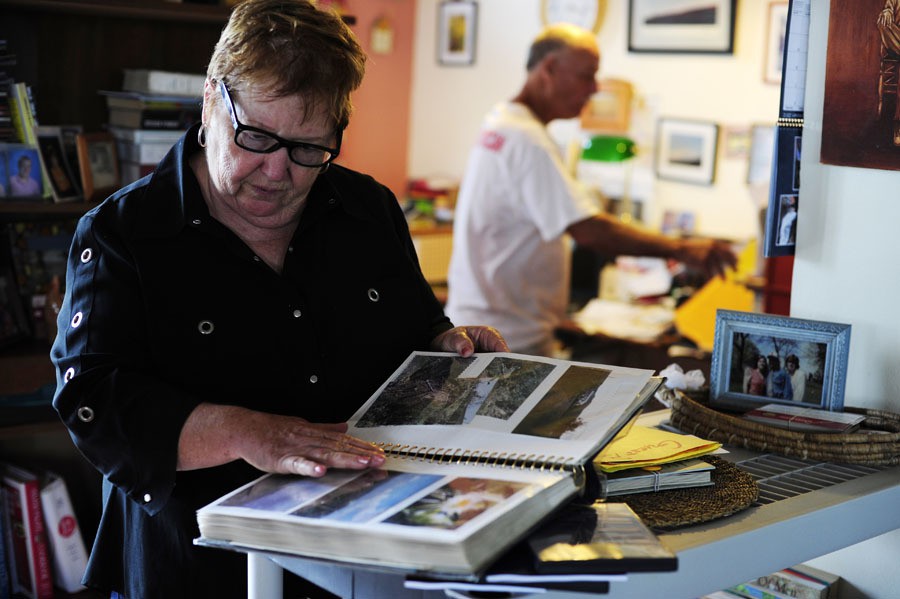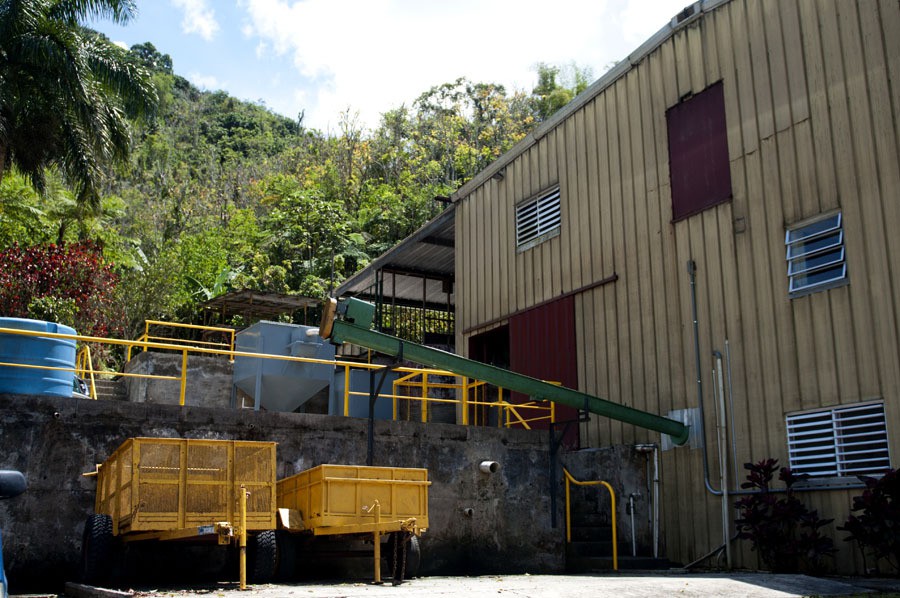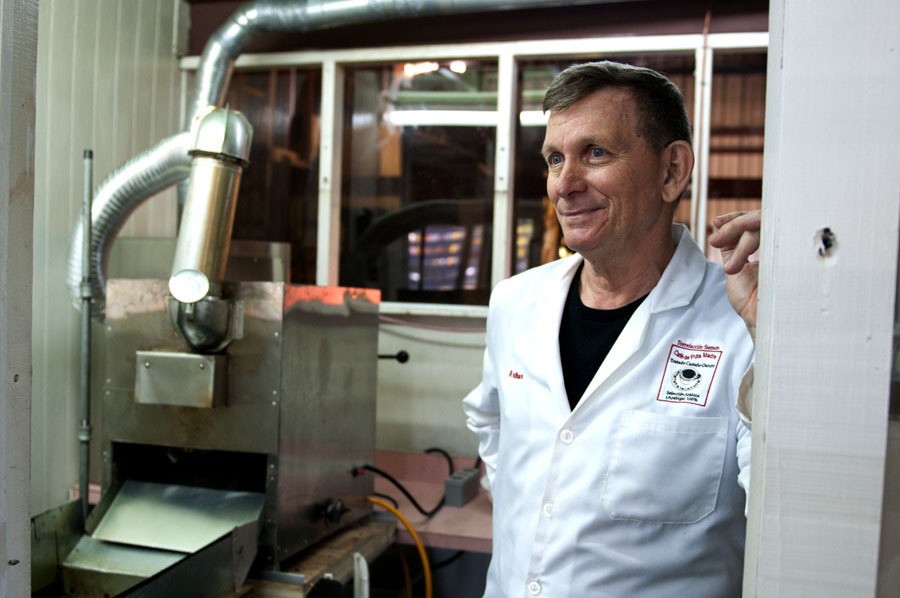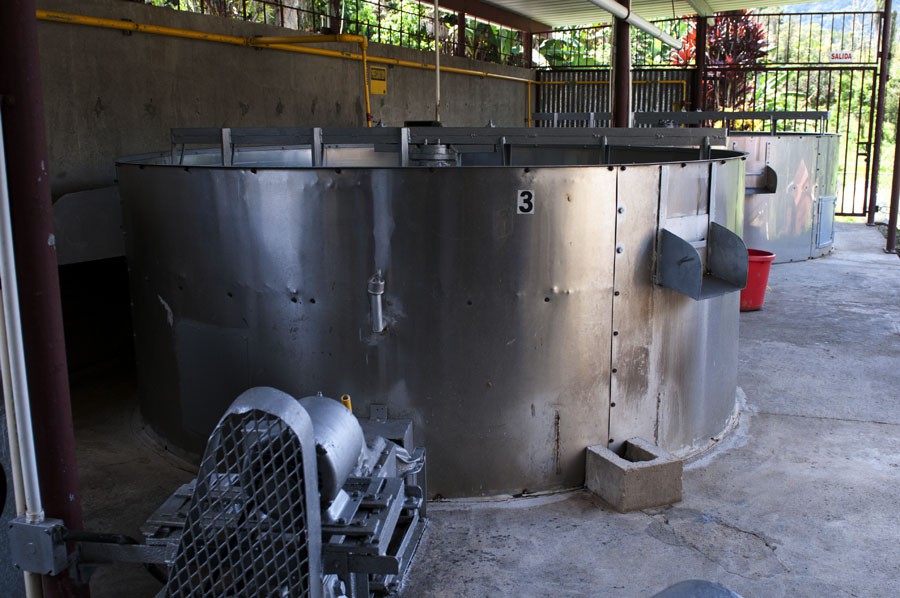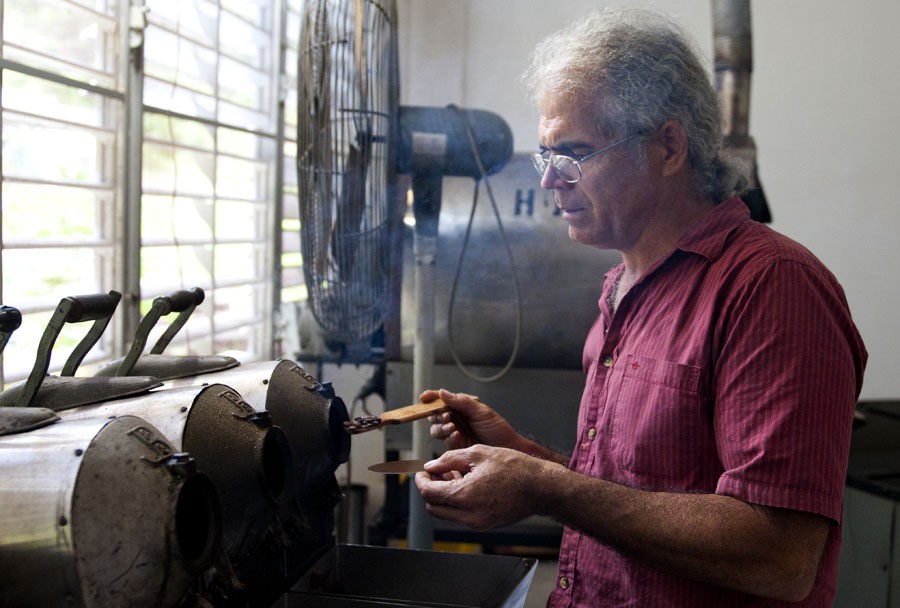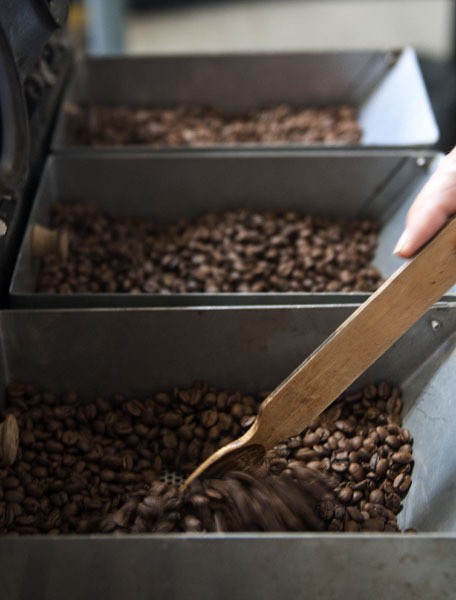A Coffee Paradise Suffers Lack of Labor for the Harvest

By Donyelle Kesler
Cronkite Borderlands Initiative
ADJUNTAS, Puerto Rico -- Thousands of acres of mountainside coffee plantations that once helped make Puerto Rico one of the most prominent coffee producing regions in the world have been untouched in recent harvests.
The demand for Puerto Rican coffee has not declined; in fact, the local demand outweighs what the farmers can produce. But the inability to find enough coffee bean pickers willing to perform the tedious work at minimum wage has crippled the Puerto Rican coffee business over the last decade.
The lack of willing workers exists despite an unemployment rate of 15.2 percent on the island as of this March, according to the Bureau of Labor Statistics, a jobless rate almost twice that on the mainland United States. The dilemma has coffee growers and politicians considering help from abroad -- either from undocumented immigrants or through guest worker programs.
The once a flourishing industry has become a struggling trade for farmers whose production is a fraction of what it was in the past.
Driving along the roads that wrap around the central Adjuntas mountains, William Mattei spots thousands of coffee trees that cover the hillsides.
"You see there? Coffee trees, coffee trees, coffee trees," he says as he points out the window of his four-wheel drive Mitsubishi Montero.
The Adjuntas region is not an exception. Thousands of acres of farmland in the lush central mountains of the island are covered by the small trees. From roadside views it's hard to believe that farmers have actually cut back on what they cultivated; but the reality for farmers, roasters and intermediaries like Mattei is that the majority of the beans produced on those trees will never be used.
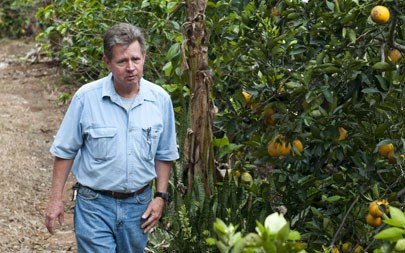
William Mattei walks through fields of coffee and citrus trees at Luis Acevedo's farm in Adjuntas. Photo by Molly J. Smith. |
"It's the picking," said Mattei who grows coffee and owns a producing plant where beans are washed, hulled and dried before being sent to roasters. "I can keep a farm of five workers but I need 20 people to pick. For picking you need young people, old people, retired people and we give jobs to people that cannot get jobs anywhere else. We give jobs to people who have social problems, physical problems; we just need hands to pick coffee."
Coffee is a major crop of Puerto Rico. According to the 2007 Puerto Rico Census of Agriculture, there were 4,094 coffee farms on the island that brought in $41,721,396 that year just below sales of plantains, which brought in $44,874,655. But as a result of labor shortages during harvest over the last decade, some farmers claim that nearly 75 percent of their crops go unpicked.
Coffee production has been a pride of Puerto Rico since the 18th century according to former Secretary of Agriculture Javier Rivera, who has worked closely with the industry over the last 16 years as a both a field agronomist and politician. He says the island's coffee was once considered a luxury item during its first years of cultivation with a family from the Castaner region of the Puerto Rico supplying coffee to the Vatican, as it was the beverage of choice of several popes. Soon, large haciendas were put in place to market and expand coffee production.
According to Rivera, an influx of undocumented immigrants from the Dominican Republic in the 1980s kept the coffee industry thriving. The industry was dependent on thousands of workers who were in the country illegally. When Hurricane Georges struck Puerto Rico in 1998, it took a toll on the agriculture industry wiping out nearly all of the island's crops. Because it takes a coffee tree three to four years to mature, Puerto Rico did not realize there was a deficit of workers until 2002 when it came time to harvest.
"In 1996 we were not experiencing a real issue with labor but then the government didn't recognize that the locals were actually absent," Rivera said. "But since Hurricane Georges pretty much devastated the area where these immigrants were working, they had to move elsewhere. They had to work and they came to the San Juan area and now they don't want to know anything about picking coffee."
To deal with the issue, Rivera, who at the time was serving in the Legislature, worked with lawmakers to offer alternatives to farmers to increase the number of workers during harvest. "Manos pa'l Campo" (Hands for the Fields) was an initiative introduced to stimulate the industry. It included educating the public about coffee production. However, Rivera says he knew international migrant workers were the real answer to end the labor shortage.
"When I was in the Legislature, I knew that the only way to solve this problem was to bring people from overseas, people who were skilled and who needed to work; needed to work in order to eat," Rivera said.
Legal, Foreign Labor Seen as Solution for the Industry
In February of 2011, the Puerto Rican Senate passed Bill 1038, a measure that would allow farmers to hire foreign laborers to solve the labor shortage. But in order to make an international call for workers, the island first has to prove that both local and national residents do not want to take these jobs.
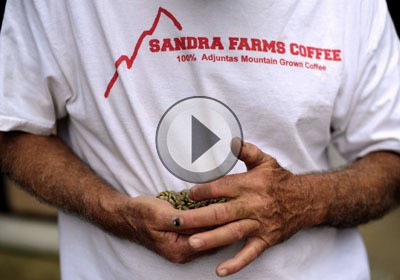 SLIDESHOW: Coffee is a major crop in Puerto Rico, with over 4,000 farms that bring in more than $41 million a year, according to the 2007 Census of Agriculture. |
"Everyone thinks it's going to be Dominicans," said Sandra Gonzalez of Sandra Farms, a coffee operation in Lares, Puerto Rico. "Dominicans don't pick Dominican coffee. Generally, Haitians pick Dominican coffee. So when you have, you know, all these people that don't pick coffee that don't farm, how are you going to farm if you don't bring someone in that wants to pick it, that wants to make the money? They had a campaign three years ago, they had signs up, 'Puerto Rican Coffee picked by Puerto Rican hands.' Wonderful. Go. Bring me the hands!"
Sandra and her husband Israel retired early from their jobs in the United States. Their dream was to own a farm.
"I was born on a farm and even though I lived in New York City, I grew up there, I wanted to have a farm someday," Israel said. "And bingo! We got it and by circumstance very close to where my father was born."
Israel's father owned a small, mountaintop coffee farm in Lares, a municipality just west of Adjuntas. The husband and wife team arrived on the island in 2004 and turned the original land into Sandra Farms. It now covers 225 acres.
In 1998, the pair faced a setback when Hurricane Georges destroyed their home and coffee crops. After starting from scratch, the pair decided to sell specialty coffee instead of selling their coffee to the government as they did before. In their market, the coffee beans are picked at their prime ripeness. Getting to the beans in time however, has been a challenge.
"At harvest time is when you employ most people," Israel said. "But for example for 28 or 30,000 trees you really should have 40 or 50 pickers but we get maybe 15."
Over the last 10 years, the Gonzalezes say they have lost close to 10,000 trees due to both the labor shortage and damage to the crops from pests or other organisms, but they don't bother restoring the crops for fear they will go to waste.
"Why would I replace that tree if I can't pick what that tree is gonna produce?" Israel said. "What happens is you lose most of your harvest, and there goes your profit."
In the past, the Gonzalezes have sought help from local government, applying for programs through the Puerto Rico Department of Labor to bring in international migrant workers to help during harvest. However, while the Puerto Rican Department of Labor allowed foreign workers to apply for temporary visas to work in industries like construction, there were no such guest workers programs in place for agriculture.
"We would like to see one (guest worker program). It's the only way to maintain coffee production in Puerto Rico. Period. Because otherwise it's going to die," Israel said.
Before 2011, the Puerto Rico Department of Labor did not offer H2A Visas for farmers according to Puerto Rico Department of Labor State Monitor Advocate Carlos Roman. While Roman cannot explain why, he says that prior to coming to the department in 2010, the staff wasn't aware that such a program existed and how to assist farmers who were requesting to hire foreign workers. He says that when he discovered Puerto Rico was not practicing this program, he immediately had it implemented and began taking applications in July 2011.
The visa, a temporary agricultural program, allows employers who anticipate a shortage of domestic workers to temporarily bring foreign workers to the island. Before farmers can be approved to hire these workers, an application must be filed stating there are no other workers willing or available to carry out the work.
"The employer has to provide them (foreign workers) with housing and has to comply with federal regulations," Roman said. "Some farmers don't have the necessary resources to build those houses to bring the aliens. If they don't have the housing, the application cannot be approved."
Importing Coffee Into a Coffee-rich Land
Ironically, as a result of the local worker shortage coffee is now being imported to Puerto Rico. In many cases the imported coffee, much of which is from Mexico, is processed on the island and is sometimes mixed with the local coffee.
"We asked the roaster not to mix our coffee with other beans so we could show it off to our family in Germany -- and when I picked up the roasted coffee, he confirmed he had mixed it with other coffee," said Kurt Legner of Pomarrosa Farms.
Like Sandra and Israel, Legner and his family decided to sell specialty coffee after they found they weren't making a desired profit selling commercial grade. Now they do their own processing, from the growing to roasting.
Legner said that Puerto Rico currently consumes some 300,000 quintals or 30 million pounds of coffee and local growers only produce about 10 million pounds -- meaning 20 million pounds are being imported, usually from the Dominican Republic and Mexico.
Legner says he is one of only a few coffee producers who can say they offer 100 percent pure Puerto Rican coffee.
"People complain that there's not enough jobs in Puerto Rico," said Legner's son, Sebastian Legner. "There are jobs, all in the field, pick coffee, plant vegetables, but they don't want to because they'd rather stay at home watch T.V. -- have their big T.V. screens paid by the government. And as long as this continues, nothing is going to change in the agricultural world here in Puerto Rico. It's very upsetting because us young people have to take care of family business like this one."
A Universal Problem in Agriculture
Rivera, the former Secretary of Agriculture, agrees that welfare and unemployment has played a major role in the decline of production.
"Unemployed people aren't necessarily willing to do anything," he said.
As a commonwealth of the United States, Puerto Rico residents are eligible to receive government benefits including unemployment compensation, disability payments and food stamps, which Rivera says are discouraging those without a job to take on the grueling labor of working in the fields.
"Welfare had a very kind intention in the beginning but now it's a different story," Rivera said. "Younger generations see coffee harvesting as a very sacrificed way for wages earned. Hence, most coffee pickers are in the 40 plus years of age. On top of that, the harvest only lasts five months total for Puerto Rico, two months per farm. Its seasonality does not offer the stability people look for nowadays."
These issues are not exclusive to the island. Labor shortages linked to lack of people willing to take these jobs are universal problem in agriculture including several regions in the United States.
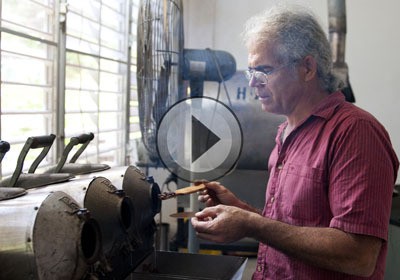 SLIDESHOW: Much of Puerto Rico's coffee is grown in the Adjuntas Mountains of central Puerto Rico. The process for harvesting coffee is labor intensive. |
"Just last year when Georgia passed a law against illegal immigrants guess what happened," Israel said. "The illegals said ok we're out of here and guess what happened? The peaches and all the harvest were not picked very well because there were no laborers to pick it and Georgians did not run out and pick them. Not even given to them."
Rivera explained that the issue with unemployment has more to do with the expectations of life and that most of the people categorized as unemployed are those who are actively seeking a job, most of which are professionals.
"If you look at the profile of people looking for a job they're teachers, chemists, biologists, most are professionals and they have hopes for finding a job in what they study and they're not necessarily thinking that they're going to pick coffee to bring the prize winnings home," Rivera said.
Manos pa'l Campo aimed to change that. The program started in 2011 with a call for people in close proximity to the coffee plantations to work in the fields, especially those who were unemployed. To further address the unemployment problem, the government also made it possible for those who chose to work during the harvest to still receive their benefits, including food stamps. But those who did go to the fields quit very quickly.
"Some of these people showed up on the farm and by our records they lasted three days on average," Rivera said. "That means the one that worked the most was six days and the one that worked the least was one day so we really have to understand that one issue is having a lack of people to harvest coffee and another is unemployment."
After screening prisoners on the island, who were charged with misdemeanors and demonstrated good behavior, 300 were chosen to take part in the program and work in the fields with no pay. However, only 80 worked in the fields as farmers felt uneasy about allowing them onto their fields, including the Gonzalezes.
"We would have used it but the women who at that time picked our coffee said go ahead, bring in whoever you want but I'm not coming," Israel said. "I'm gonna lose a regular coffee picker because she's fearful? Forget it. I don't want the program. It was a business decision."
The local government also created a Field Experience program to educate people on the process behind coffee production, hoping to spark an appreciation for what goes into every cup they drink. Groups of Boy Scouts, high school students and volunteers were invited to the fields to help with the harvest.
The program had limited success.
A Last-Ditch Effort to Attract Local Workers
This year, a pilot program was launched to bring workers from other parts of the island where no coffee is being grown.
However, the U.S. Department of Labor has safety, transportation and housing requirements if farmers hire workers from outside the farming region. These workers would have to be provided with transportation to and from the fields with each passenger having a seat with a seatbelt and/or temporary living quarters with a place to prepare food. But many farmers have balked, saying what was meant to be a solution for farmers, amounts to more inconvenience.
"Not a lot of farmers want to invest and go the length that the Department of Labor was requiring," Rivera said.
To assist farmers, Rivera convinced Governor Luis Fortuno to invest $600,000 to establish living quarters in three municipalities, Yauco, Maricao and Jayuaya. Old schools that were left unused were refitted to comply with the Occupational Safety and Health Administration and the Department of Labor.
If the island can prove that there is still a shortage after the pilot program, then Puerto Rican coffee farmers will be allowed to begin an international call for foreign workers to try to revive the industry.
For Rivera, the Gonzalezes and many others on the island, this is the only way they see to stem the labor shortage and to bolster the industry. Still others see drawbacks.
"It would be like bringing the prisoners to pick the coffee," farmer Luis Acevedo said. "They would feel out of place…They would feel intimidation from us. But I would take them if I needed them."
Acevedo is a Puerto Rican local who's owned his own farm since 1997. He employs workers from other cities but has a place for them to stay on his farm and says there is in fact an interest to work from other parts of the island. However, Acevedo has begun replacing coffee trees with citrus, feeling less confident about where the coffee business is going.
Mattei also said he believes there are people on the island willing to take these jobs and says solving internal problems will help alleviate the shortage.
"The farms have to be in better condition," Mattei said. "Instead of punishing the worker, let's improve the farms so the workers are more motivated to work in the coffee field. Decent bathrooms, shelter and the pay should be better. If the pay was better some of these issues will be solved."
This year, Bill 1038 went into law. However, according to Rivera, the Department of Labor is requiring the state to issue a certificate of need.
"This bill is what I refer as a 'born-dead' law," Roman said. "It cannot be applied to Puerto Rico because all the provisions and all the mechanisms to hire workers form outside United States have to be managed by federal government. States have no authority to pass immigration laws. The bill, for me, has no validity."
Tension between the farmers, local and federal government has made finding a solution to the problem a drawn-out, difficult process. It will be another year before the results of the national call will be known and even then farmers may not agree on whether hiring foreign workers will meet their needs. In the mean time, farmers have found ways to create supplemental income and keep the farms going. While some like Acevedo are expanding into additional crops, others like the Gonzalezes and Legners offer "agri-tourism" such as tours of their farms and facilities to travelers and interested locals.
"At least we started moving in the right direction," Rivera said. "It's something later on I'm going to tell my kids, the story of how we started this movement and how I got to be part of it and we have to keep going."
Back to Top

